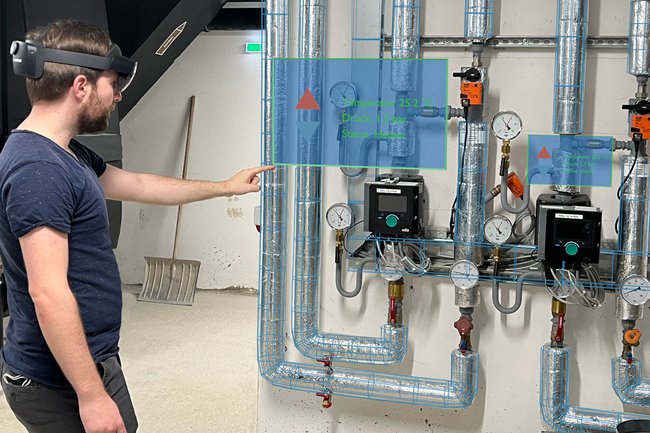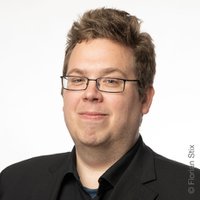Extended Reality in the Factory Hall
A Project on the Application of Extended Reality in the Business World

The St. Pölten University of Applied Sciences coordinates a project that explores the use of Extended Reality (XR) to let company staff acquire new competencies and optimise processes.
Train and troubleshoot remotely
The computer-assisted augmentation of perceived reality (Augmented Reality) and environments combining real and virtual worlds (Mixed Reality) offer new possibilities of collaboration and data visualisation. So far, however, the advantages and potentials of these technologies are hardly used in many industries.
At the same time, it is sometimes necessary to map environments entirely virtually (Virtual Reality), for example for the basic training of new employees or the simulation of processes. Each of these technologies has its own, specific application areas – they are summarised under the term “XR” (Extended Reality).
The aim of the project IMPACT-sXR is to offer support by developing a training and assistance concept that makes it easier for users to intuitively learn new ways of working and to apply technical specialist knowledge with the help of task-related planning, execution and production information.
“The COVID-19 pandemic in particular has shown that these technologies offer advantages when it is impossible for all staff members to meet on site. Trainings and problem-solving can take place even when two persons are physically apart”, explains Thomas Moser, head of the research group Digital Technologies at the St. Pölten UAS. In future, this can also be used to save travel expenses.
New Forms of Collaboration
On the one hand, the project examines new forms collaboration independent of space, which includes working in teams by integrating real-time 3D information of the actual environment and real-time production data that users can interact with. On the other hand, these technologies open up new ways of data visualisation in industrial manufacturing processes by allowing to fade in essential data directly on site, within the production flow.
Using tablets, smartphones or special data goggles, staff members can capture spaces or machines and send these images to colleagues elsewhere who help them solve problems. With the help of Augmented Reality, employees on site can receive instructions or training.
“XR-assisted instruction and learning methods allow for better training scenarios. They increase the measurability of learning successes and make it possible to adapt trainings to changed conditions faster. Moreover, training contents can be used for more participants without having to install additional software and typical elements of gamification can be integrated into the transfer of contents”, says Moser.
Acceptance and Sustainability
The project partners are also developing a strategy to embed the project results in the companies in a long-term and sustainable manner by examining how the way in which employees work changes and how to increase the acceptance of this new technology.
Furthermore, the project team explores advantages of XR solutions such as sustainability, energy and resource efficiency, and a potential reduction of the ecological footprint.
A Network of Universities and Companies
The project features 20 industry partners and four Lower Austrian higher education institutions working together. Thanks to this large network, a wide range of possible applications is covered and the knowledge of the XR technology’s potential applications is therefore guaranteed to be widely disseminated.
Wherever no company-specific data or processes are affected, the research results achieved will be made available to the public and thus be of use for companies not involved in the project as well.
The project is financed by the Lower Austrian business agency ecoplus and the Austrian Research Promotion Agency (FFG).
Project IMPACT-sXR – Industrial Manufacturing Processes and Collaboration Tools for Sustainable XR

FH-Prof. Dr. Thomas Moser
Head of Research InstituteInstitute of Creative\Media/Technologies Deputy Academic Director Smart Engineering (BA) Senior Researcher Industry 4.0 Smart Engineering (BA) Department of Media and Digital Technologies